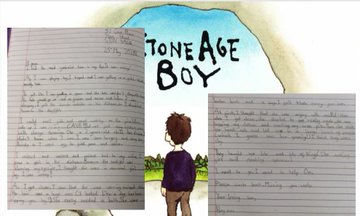Writing
 Intent:
Intent:
At Kingswood Primary Academy, we believe that writing is a key, important life skill, and we are dedicated to ensuring that our pupils are writers from an early age. It is our intent that we provide pupils with a high-quality education and have a holistic approach to the teaching of writing. We want pupils to acquire a wide range of vocabulary, a solid understanding of grammar and be able to spell new words by effectively applying the spelling patterns and rules they learn throughout their time at Kingswood. We believe that all pupils should be able to confidently communicate their knowledge, ideas and emotions through their writing.
Our intentions are:
• To deliver a curriculum that develops speech, language and vocabulary and results in the acquisition of knowledge and skills that children are able to transfer to other subjects, as well as developing on these skills in the next academic year to help them reach and exceed their potential.
• To deliver a curriculum that develops a love of writing and enables children to apply their writing skills in all subjects and to discover new knowledge, building on prior knowledge and fuelling their imagination for ideas to use in their own work.
• To provide opportunities across all curriculum areas for the development and application of speaking, listening, reading and writing skills. The wider curriculum provides regular opportunities for pupils to use and apply the writing and spoken language ski lls they have acquired.
• To use a range of sources to support the learning of writing to ensure that children are progressing and successful when learning how to write.
• To write clearly, accurately and coherently, adapting their language and style in and for a range of contexts, purposes and audiences.
• To enable children to take pride in the presentation of their writing and, in time, develop a joined handwriting style.
 Implementation:
Implementation:
All staff plan engaging writing lessons following the EYFS, KS1 and KS2 National Curriculum and high-quality texts are selected to help form the unit of work. Our units of work are based on units from Literacy Shed Plus, and then adapted to meet the needs of each individual class. We teach English as whole class, so that all our children have access to the age-related skills and knowledge contained in the National Curriculum.
Within lessons, teachers and teaching assistants target children who require extra support to achieve the learning intention and provide the scaffolding necessary for them to do so. We ensure that children are challenged in their English lessons as they are given the opportunities to extend their writing through showing a deeper understanding of the impact that their writing has on the reader and by using a higher level of voca bulary and grammatical features. A positive writing culture is created across the school, where writing is celebrated, promoted, enjoyed and considered to be a pleasure. Our writing curriculum ensures that all classes have a prominent focus on vocabulary, with teachers planning vocabulary to pre-teach at the beginning of new topics or units, and discussing it with children when coming across it in new texts.
Punctuation and Grammar skills are a key focus of our English lessons, and these are taught explicitly for 4 weeks during the first term of the school year, using the Grammarsaurus ‘Place Value of Punctuation’ units as a basis. Following the completion of these units, these skills are revisited and built upon as an integral part of English lessons. Teachers plan to teach these required skills through the genres of writing that they are teaching.
Spelling lessons are taught in addition to English lessons, once children have completed their Phonics learning. These spelling lessons build on links to phonics knowledge and encourage children to consider etymology, morphology and grammar when learning to spell new words.
Handwriting is taught explicitly across the school and follows the ‘Kinetic Letters’ handwriting guidance. From EYFS, children are taught rhe skills to allow them to hold a pencil comfortably and correctly; form lower-case and capital letters; understand which letters belong to which handwriting ‘famiies’ and learn how to join letters to ensure legibility and consistency in their writing.
 Impact:
Impact:
Children make good progress in writing. They develop their knowledge of language and vocabulary in extended pieces of writing and support this with their knowledge of spelling, punctuation and grammar.
Children become confident in writing and are able to use writing across a range of genres. Children of all abilities are able to succeed in all English lessons because work is appropriately scaffolded and adapted.
Pupils understand how to edit their work to ensure that they can adapt their writing and improve it. Evaluating their own progress enables the children to talk freely about and celebrate their achievements, as well as carefully consider their next steps.
Attainment in writing is measured using the statutory assessments at the end of EYFS, KS1 and KS2. Writing is frequently assessed to ensure that our planning and teaching meets the needs of the children and accelerates progress.
Handwriting
At Kingswood Primary Academy we use the Kinetic Letters programme to teach handwriting.



